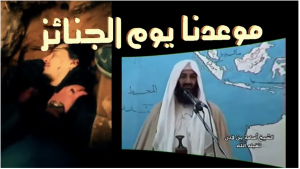The Al Nusrah Front, al Qaeda’s official branch in Syria, has released a video honoring a man who defected from the Lebanese Army to the jihadists’ cause before he was killed. The video, which was posted online last week, is part of Al Nusrah’s ongoing attempt to rally Sunnis to its cause by portraying the Lebanese government as an agent of Iran and its terror proxy Hezbollah.
The propaganda production begins with photos of Osama Mansur, also known as Abu Umar, who is described as a “martyr.” Mansur was “assassinated” by Lebanese intelligence in Tripoli, a city in northern Lebanon, Al Nusrah claims. Still photos of Mansur from both before and after his death are shown, in addition to clips from his funeral, which “thousands” of Sunnis purportedly attended.
Text is scrolled on the screen alongside footage from Mansur’s funeral. The “spark” of jihad was “ignited in Damascus” and has spread to Tripoli, “the land of heroes,” it reads.
Mansur and his comrades tried to avoid fighting with the Lebanese government, because they didn’t want to spill “innocent Sunni blood.” But they were left with no choice after they realized the government is merely a “puppet in the hands” of Hezbollah. Mansur and his friends then turned to jihad.
The Sunnis of Lebanon should follow Manur’s jihadist path, Al Nusrah argues, and “rise up before what happened in Syria, Iraq, and Yemen reaches” their home country.
Mansur initially joined the Lebanese Army, believing that he could make a difference, the Al Nusrah Front’s propagandists write in the video’s text. But he soon discovered the “truth” about the army — that it is under Hezbollah’s control. Al Nusrah credits Mansur with starting a “defection movement” targeting senior military officers. Mansur warned that the army was beholden to “foreign agendas” and he called upon others to “repent.” He threatened the “rejectionists” (a disparaging term used by Sunni jihadists to describe Shiites) in Lebanon and then moved to Syria to fight Bashar al Assad’s regime, as well as Hezbollah.
Al Nusrah says that Mansur fought in Al Qusayr, Syria, where the Syrian regime and its allies clashed with rebels in 2012 and 2013. He used his bomb-making skills to attack the Shiite forces.
Mansur returned to Lebanon to battle those Shiites who were sending their “sons” to fight against Sunnis in Syria and Tripoli. Al Nusrah even claims, without offering any evidence, that Mansur saved Sunnis in Tripoli from “massacre” plotted by Lebanese officials.
Towards the end of the video, Al Nusrah a clip of Mansur being buried is spliced together with footage of Osama bin Laden giving a speech. In his address, Bin Laden encouraged jihadists to sacrifice themselves for the cause, until the Aqsa Mosque in Jerusalem is liberated.
A screen shot showing Mansur’s body alongside the footage of bin Laden can be seen at the beginning of this article.
The Al Nusrah Front and al Qaeda in the Arabian Peninsula (AQAP) have increasingly marketed their jihad as being a response to Iranian-backed Shiite militancy across the region. Mansur’s “martyrdom” video is clearly part of this same campaign. While both al Qaeda branches are advocating war against Shiite forces, they do not endorse the types of ostentatious and brutal tactics advertised by their rivals in the Islamic State.
In March, for instance, AQAP quickly denounced an attack carried out by the Islamic State’s followers at Houthi mosques in Sana’a. While AQAP routinely claims responsibility for attacks against Houthi military and security forces, which are backed by Iran, the group’s officials have issued guidelines prohibiting direct attacks on Houthi and other Shiite civilians.
Al Nusrah’s video biography for Mansur explores the same themes pushed by the group over the past year. Al Nusrah has repeatedly alleged that the Lebanese government is “under the sway of the Iranian party,” meaning Hezbollah. Thus, the al Qaeda organization portrays Mansur as a popular revolutionary who opposed Iran’s influence in Lebanon and Syria.









1 Comment
nice localized ‘snapshot’ of the Byzantine Political Maze that has enveloped the Middle East & adjoining areas. Thanks for the info